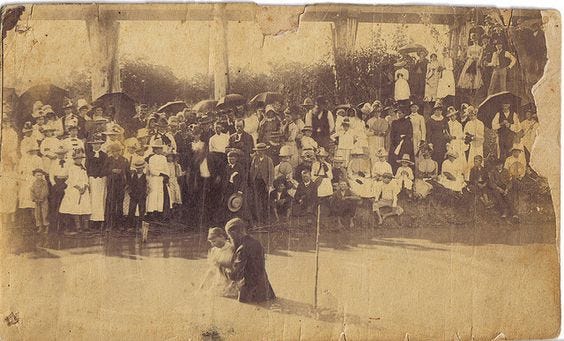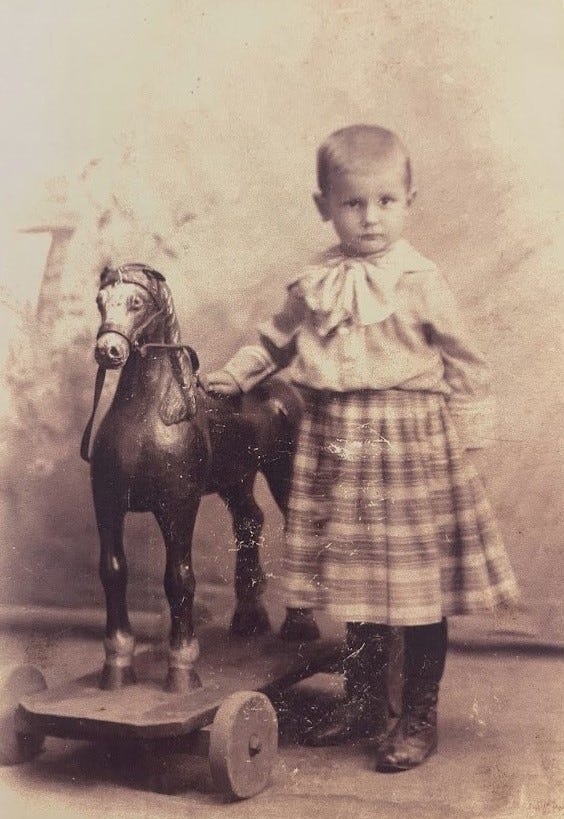A Boy Named Virgil, Part 1: Baptisms in the Big Muddy and More
Tales from a Small Village in Southern Illinois Circa 1900
A Boy Named Virgil is the first-person account of Virgil Bravard Browne, based on a letter he wrote to his niece, Marcia Moore Sagebiel, in 1958. The story is edited and read by me, his grandnephew. Read the introduction.
In the small village of Noble, Illinois (population about 800), on the date of July 14, 1892, a son was born to Henry Marshall Browne and Martha Margaret Browne (nee Tolliver), and was named Virgil Bravard Browne.
That son was me.
The name Virgil was taken from the poet of ancient times and of whose works my father was an avid reader. Bravard was the maiden name of my maternal grandmother, who is also your father’s, as we have the same mother, as you know.
On September 16, 1892, one year to the day of his marriage, my father died of a disease known at that time as “lung fever,” or galloping consumption, at the age of 29 years, leaving my mother a widow at an early age as she was some years younger than my father.
Photo details by Marcia Moore Sagebiel: The hobby horse, a prop of photo studios, was circa 1895. Virgil cried when he wasn’t allowed to take the horse home. He wore a blue-and-white kilt, a blouse of blue wool, black-button shoes and cotton-ribbed, full-length hose.
As was the usual procedure of that time, she went back to her parental home, taking me with her, of course, and resided there until her marriage some three- and one-half years later to your father’s father.
I dimly recall the wedding mainly because of the attention I received from the wedding guests who filled the house, and being tossed up in the air, having my hair mussed and my ribs tickled until I screamed; and also the vast amount of food served, of which my main interest was in the cake and homemade ice cream, of course.
My grandparents wished to keep me and raise me themselves, mistrusting a stepfather and feeling that a marriage would have a better chance of success if there was no outsider — as most stepchildren are considered — to argue about. Hence, my grandparents’ home became a permanent home for me.
This home, while not measuring in luxury to the standards of today, was nevertheless as comfortable as any of that day. It was located on the last street of the town and comprised an area equal to a small farm located in town, being a block long on one side of the alley and a half block long on the other side, with a cow pasture of two- and-one-half acres across the street and another pasture directly east of it of some three acres in area.
Long Hours at First Baptist
Across the street from our house was the First Baptist Church on a half-acre patch of ground, in which I passed many long hours squirming and twisting from the heat in summer and shivering in winter, for the tall centrally located coal-burning stove was far from adequate in dispensing heat sufficient for the congregation’s comfort. Those near the stove sweated and those a short distance removed from it froze, as the room had a very high ceiling and was about 40 by 80 feet in area, seating possibly 200 people.
Beneath the rostrum, which was hinged at the back, and by a device consisting of ropes and pulleys (not present ordinarily), the rostrum could be raised, revealing a tank filled with water in which new members could be immersed, the final rite of becoming a member of the congregation of the Lord. This baptistry was not in use when I first became an attendant to this church, but the tank was still there, which I discovered by crawling under the church during the summer.
The sermons preached by the ministers of that era will long stand in my memory. The evangelists even more so.
A minister who could not hold forth in his dissertation of the word for more than an hour was not considered as being much of a preacher. Some extended their exhortations as long as two hours, much to the disgruntlement of the junior part of their audience, who could dream up many things that would be of more interest to them than a Hell of cobalt blue and red flames curling around the sinners, with the smell of sulfur and brimstone as an accompaniment.
The fear of such punishment exceeded the hopes of reward by far, and I am afraid was not very lasting, resulting in what was known in that day as backsliding.
Baptisms in the Big Muddy
Baptizing the members in my time was done only during the warmer weather and in the Big Muddy River, which was some five miles from Noble. This was an occasion to which I and others of the same age looked forward to, as there was a long procession of buggies, surreys, spring wagons, and a few on horseback wending their tortuous way to the river.

The minister led the converts into the water until the water was almost up to their hips. He then would place one hand behind the convert’s back, the other hand in front of he or she, and he or she would hold on to it, at which moment the minister would recite the old time, “I baptize thee in the name of the Father, the Son, and the Holy Ghost, Amen!”
Then backward they would go, coming up from the water sputtering and looking like drowned rats, especially the ladies, who had little experience with water because few could swim and who naturally regarded water in quantity greater than was sufficient to take a bath in with great misgivings.
I recall one baptism that almost became a tragedy. There was a middle-aged woman of great heft. The minister was a slight and elderly man, so when he pulled her backwards to immerse her, her stockinged feet slipped on the clay bottom of the river. The minister was unable to bring her erect and in the struggle he lost his hold on her and she went bobbing down the river, which was somewhat higher than usual for the rite of baptism.
On the bank there were screams from the ladies and I am afraid some profanity from the men shocked by the incident, but the lady floated like a cork and in a few yards hit a sand bar and scrambled to her feet none the worse for her adventure, aside from a small quantity of muddy water that escaped when she attempted to scream. The incident was the main topic of conversation for quite a long time.
After the baptizing, many people would stay and wash their buggies and surreys in the river, as there was no water pressure in town and the muddy roads made even a new vehicle look very dowdy in a short time. This practice was frowned on by the older members of the congregation as sinful and desecrating the Sabbath day.
I recall that no work was done by our household on Sunday, except that which was absolutely necessary, such as feeding the stock, milking the cows, and some cooking. The house had been cleaned on Saturday, and all was in apple-pie order1. Even extra wood had been brought in, which was my job, so I really hated Saturday with the extra work, but I enjoyed the freedom from the chore on Sunday.
Thank you for reading. If you liked this slice of FRIED BOLOGNA, please click the 🤍. Access the archives.
“Apple-pie order” is an oldtime idiom that means neat and tidy.





Interesting concept of leaving your child from first husband with grandparents to start the next marriage out fresh. I think I may have run across this before but did not recognize it for what it was.
Another thumbs up